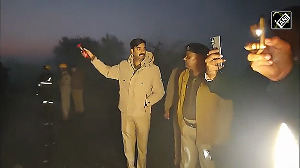Leaders across the political spectrum in Bangladesh mourned the death of veteran communist leader Jyoti Basu, who passed away on Sunday after losing his fortnight-long battle to pneumonia that led to complications and multi-organ failure.
Basu, 95, who strode the political arena for over six decades and was a leading figure in uniting opposition parties against the Congress in the 1980s and 90s, is survived by son Chandan, his daughter-in-law and three grandchildren. His wife Kamal had died four years ago.
Bangladesh President Zillur Rahman, Prime Minister Sheikh Hasina and leader of the main opposition BNP Khaleda Zia expressed deep shock at the death of the former chief minister of West Bengal.
"Jyoti Basu was a champion of progressive politics and his prudent and devoted leadership has made significant contributions to the socio-economic development of common people in West Bengal," Rahman said in a statement. He hoped that Basu's 'dispassionate ideals' would inspire politicians in the region.
In a message sent to Prime Minister Manmohan Singh, Bangladeshi premier Sheikh Hasina said the veteran leader's death had deeply saddened her. She described him as "one of the leading political figures in the sub-continent for decades, who was a great friend and well-wisher of Bangladesh".
"It (death) is also an immense loss for Bangladesh as well as myself, we have lost a tested friend and well wisher of ours," a spokesman from the Prime Minister's Office said..
Prime Minister Hasina recalled with deep gratitude Basu's 'enormous support' to Bangladesh's 1971 Liberation War and his subsequent role and personal initiative in strengthening ilateral ties. She also expressed her gratitude to the Indian leader for his efforts in finalising the landmark 1996 India-Bangladesh Ganges water sharing treaty during her previous tenure in the government.
The deal was believed to have removed a longstanding irritant in bilateral ties. Hasina, who was Basu's acquaintance for decades, kept a close watch on the health condition of the leader, who had ancestral links with Bangladesh.
The Bangladesh leaders prayed for the eternal peace of the departed soul and expressed their deep sympathy to the members of the bereaved family.
Last year, Bangladesh decided to preserve Basu's ancestral village at suburban Sonargaon sub-district as an archeological heritage site. An official familiar with the process said that it was decided to set up a museum and a library of international standard at Basu's home as part of an initiative by the prime minister herself.
The cultural affairs ministry, communication ministry and works ministry would jointly work for the rehabilitation of the Basu's ancestral home, which was abandoned after the Partition in 1947. Basu's doctor father Nishikanta Basu hailed from the village of Barodi.
Basu had visited his ancestral home twice at Barodi after the formation of Bangladesh.





